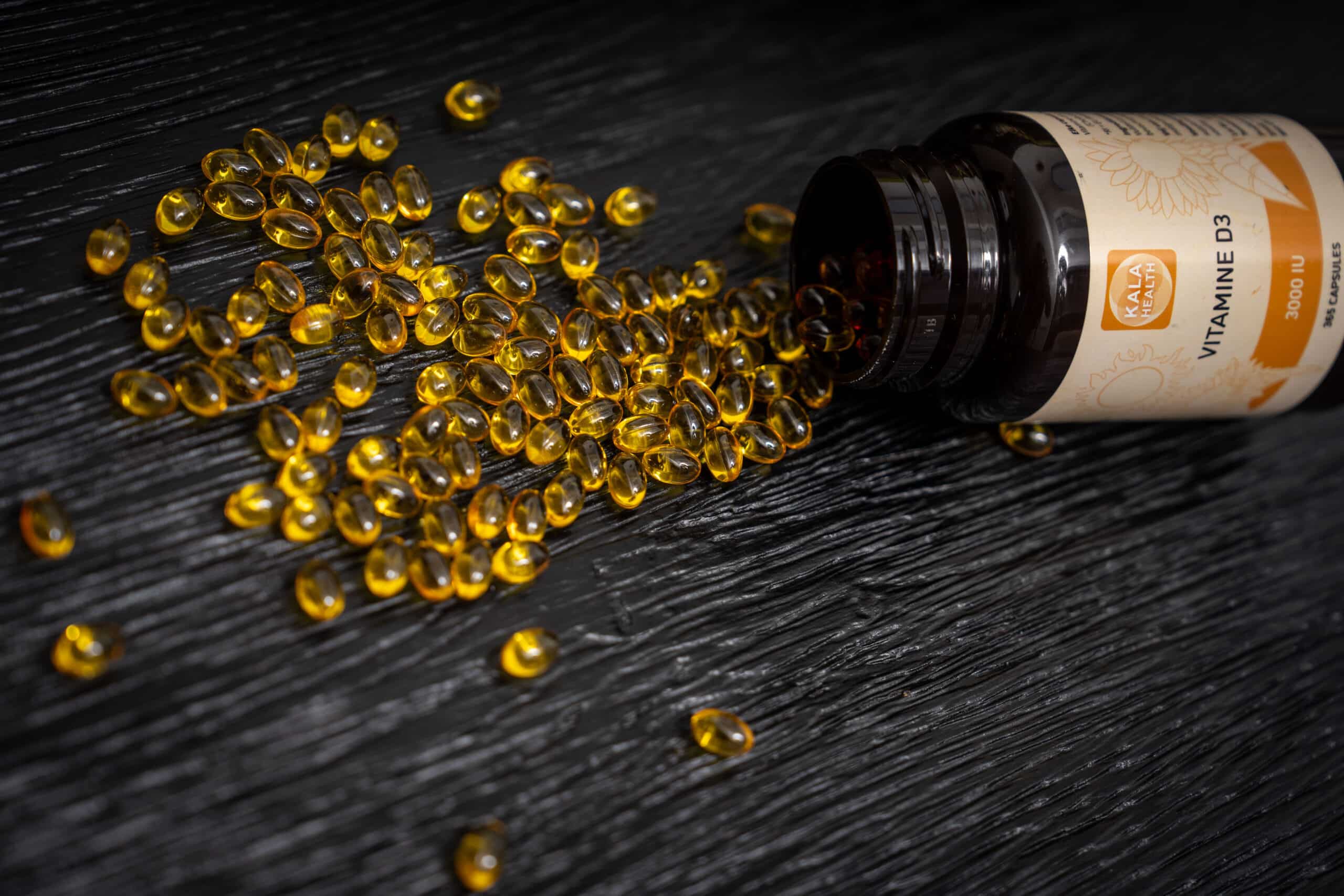Vitamin D3 3000 IU
Vitamin D3 3000 IU
- Contributes to immune system maintenance
- Contributes to the maintenance of normal bones and teeth
- Contributes to the maintenance of normal muscles
- Plays a role in the cell division process
Description
What is Vitamin D?
Vitamin D is produced in human skin in the form of cholecalciferol. This happens under the influence of (ultraviolet) sunlight. Cholecalciferol is then converted in the body into a metabolite named calcidiol and subsequently, as required, into the biologically active hormone calcitriol. Kala Health Vitamin D 3000 IU 180 capsules contain 75 mcg of Vitamin D3 (cholecalciferol) expressed in 3000 IU (international units), extracted from sheep’s wool fat. This dose is particularly suitable for situations which require increased vitamin D intake, such as during the winter months. Would you like to order Vitamin D from Kala Health? You can do so quickly and easily during the summer months!
Vitamin D requirement
If there is sufficient sunlight, more than enough vitamin D is produced in the skin. In principle, therefore, Westerners can meet their vitamin D requirements during the summer months by spending at least half an hour outdoors in the sun every day between 11 am and 3 pm. However:
- Many people work indoors during the day
- It is often cloudy
- When the weather is nice and sunny, many people use sunscreen that blocks ultraviolet light.
- Outside the summer months, the sun lacks sufficient strength.
- People with darker skin produce much less vitamin D.
The reality, therefore, is that the majority of people in the West produce far too little vitamin D throughout the year, nor do they ingest enough of it through their diet.
Optimal vitamin D blood values
An official guideline is that the optimal vitamin D level should amount to 30 nanomol per liter of blood (nmol/l), and 50 nmol/l from the age of 70. However, there are increasing indications that these values are rather low. Today, many vitamin D experts state that the optimal vitamin D level for everyone is actually at least 75 nmol/l.
It is a fact of experience that many people’s vitamin D levels fall to 20 – 50 nmol/l outside the summer months, and sometimes even lower. It is therefore a good idea to regularly check the blood’s vitamin D value. A second good piece of advice is to take vitamin D supplements outside the summer months to help maintain the vitamin D level in the blood.
How much vitamin D should you take daily? That is a very good question and one that is not easy to answer, because every person is unique. However, there is a general guideline that you can follow:
- At an initial value of 20 nmol/l, an adult western person needs 100 mcg (4000 IU) daily to reach a blood value of 75 nmol/l after one month.
- At an initial value of 50 nmol/l, an adult western person needs 50 mcg (2000 IU) daily to reach a blood value of 75 nmol/l after one month.
- After reaching a blood value of 75 nmol/l, an adult western person needs 25 – 50 mg (1000 – 2000 IU) daily to maintain a blood value of 75 nmol/l.
Please note that these are general guidelines. It’s recommended to have the vitamin D level in the blood determined every 3 – 6 months, and to adjust the daily dose accordingly.
Vitamin supplements as a solution
Taking vitamin D supplements outside of the summer months is a sensible way to maintain the vitamin D level in the blood. How much should you consume? That is a good question, and one that is not easy to answer. Every person is unique. It is recommended to have the vitamin D level in your blood checked every three to six months and to adjust the daily dose accordingly.
Ingredients
Each capsule contains:
Vitamin D3 (Cholecalciferol 3000 IU) 75 mcg (1500% RI*)
*RI = Reference Intake
Filler (sunflower oil), gelling agent (bovine gelatin), humectant (glycerol, water), cholecalciferol (from wool fat).
Vitamin D dosage 3000 IU 180 capsules
Adults can take 1 capsule daily unless otherwise recommended. Ingestion along with a (fatty) meal is preferable. Please be sure to always stick to the recommended dosage. This dietary supplement is not suitable for children up to and including ten years of age.
Permitted health claims
There is a reason the body produces large amounts of vitamin D when exposed to sunlight; this vitamin is essential and is used by the body for a large number of vital metabolic processes. On these grounds, the EU has approved the following scientifically proven health claims:
- Vitamin D contributes to immune system maintenance
- Vitamin D contributes to the maintenance of normal bones and teeth
- Vitamin D contributes to the maintenance of normal muscles
- Vitamin D plays a role in the cell division process
Composition
Ingredients:
Filler (Virgin Olive Oil), gelling agent (bovine gelatin), humectant (glycerol, water), cholecalciferol (from wool fat).
Free of: yeast, sugar, starch, gluten, lactose and soy, as well as artificial fragrances, colourings and flavourings.
Nutritional supplement, contains vitamins.
Storage: Until best-by date in a dark, cool and dry place, out of reach of children.
Obligatory disclaimer: A dietary supplement is not a substitute for a varied diet. A varied, balanced diet and a healthy lifestyle are important.
Recommendation: Please stick to the recommended dosage. Consult an expert before taking supplements in case of pregnancy, lactation, medication use and illness.
Background information
It is a fact that receptors for vitamin D are found in more than 30 different types of bodily tissues and organs, including immune cells, muscles and bones. This means that vitamin D has a broad scope and supports health in various ways. Recently, much attention has been paid to the role that it plays in immune system functioning. Almost all types of immune system cells appear to have receptors for vitamin D, including monocytes, B-lymphocytes, T-lymphocytes, white blood cells, macrophages and dendritic cells. Vitamin D receptors have also been found in the lungs’ epithelial cells. The latter is important, because sufficient levels of vitamin D in the blood can trigger these cells to produce certain substances called AMPs (Anti Microbial Peptides). These substances are known for their effectiveness against microbes (bacteria, fungi) and viruses.
AMPs play an important role in defending the respiratory tract, and are commonly found in the saliva and mucus of the throat and nasal cavities, as well as in the lungs. AMPs work by binding to the membranes of invaders, damaging them and causing the organism to die. In addition, AMPs possess properties that support the general immune system.











 60 or 180 Licaps®
60 or 180 Licaps®
 500 or 1000 gram
500 or 1000 gram 
 60 or 180 capsules
60 or 180 capsules